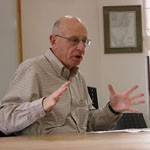By Ira Sharkansky, Ph.D

JERUSALEM — Israel’s Prime Minister Naftali Bennett has made two major speeches, One to the United Nations, and one to the Israeli Knesset. Both came in a prominent setting, although the UN speech was to a largely empty hall. The Knesset speech was at the onset of the body’s winter season, as part of a program for the Knesset chair, the Prime Minister, and the leader of the opposition to make themselves heard.
In both cases, a seemingly minor section of each speech served as the focus of what the media reported, and what was the focus of comments by various spokespeople for several days. Comments on what he said to the Knesset continue. It’s not possible to conclude that each speech, or the cited portions, were memorable, or added positively to the reputation of the Prime Minister.
To the United Nations, Bennett included a snippet of a quarrel with Israel’s medical department, i.e., when leading physicians called for restrictions focused on the Coronavirus, and the government decided, on a wider body of concerns, to keep things open for restaurants, mass meetings, and other venues where the virus might be transferred
Bennett made an interesting point. But as part of a major speech before the United Nations? In context, and in the comments that followed, it was a purely local concern. Why bother the world with it?
In the Knesset speech, the Prime Minister reported, briefly, that the Mossad was continuing in a three decade search for Ron Arad, an Israeli airman shot down over Lebanon in 1986. For some time it was clear that he had been captured; his release was the subject of negotiations that failed; and since then there’s been speculation involving Hezbollah, Iran, Arad’s death, and efforts to locate and identify a body.
Thirty-six years later, the story had largely been forgotten, until the Prime Minister mentioned Arad. We’ve since heard from a number of former military personnel, members of Arad’s family, and other civilians. Most have concluded that Bennett’s mentioning of Arad was spurious, unhelpful, and done in order to acquire a political goal. It also caused some frostiness in the Prime Minister’s relations with Defense Minister Benny Gantz, who was either not informed about the Arad mention before Bennett made the speech, or was not given a chance to dissuade Bennett from including it.
Members of Arad’s family have indicated that the IDF should not endanger soldiers to seek Arad’s body.
Why did Bennett include Arad in a speech meant to open a new season of the Knesset?
Whatever his thinking, it doesn’t appear that he’s made a change in others’ thinking about Ron Arad, or in anything knowable about his status or his body..
And it’s not clear if his United Nations speech has shaped the issue about Coronavirus, and the freedom of Israelis.
Unless the flowback about Arad continues, and unseats Bennett’s government.
Judging a Prime Minister must go beyond one or another speech. In Bennett’s case, the Prime Minister got to his job with a handful of Knesset seats behind his party, in a case of political bargaining that went far beyond whatever political power he could demonstrate. He’s been in office for four months, and seems to be holding on. Yet his prime test will come with–or without–the passage of a budget by November 4th. If there is no budget by then, the current law will end the government’s tenure.
Bibi Netanyahu remains on the sideline. His trial continues at a snail’s pace. He still leads anyone else in being favored as Prime Minister, but there’s been sounds from other Likudniks maneuvering to take his place as party leader and candidate for Prime Minister.
We’ll see how this plays out, along with continuing furor about Bennett’s mentioning of Ron Arad.
And we’re in the middle of an accusation against Shimon Peres for sexual harassment. Peres is dead, but the issue is strong enough to excite the cartoonist of Haáretz.
The comparison is with convicted rapist, former President Moshe Katsav. The statement connected with Peres is “Talking about me.”
Like Bennett’s speeches. Food for comment. Perhaps no more.
*
Ira Sharkansky, Ph.D. is professor emeritus of political science at Hebrew University. He may be contacted via ira.sharkansky@sdjewishworld.com